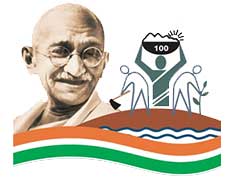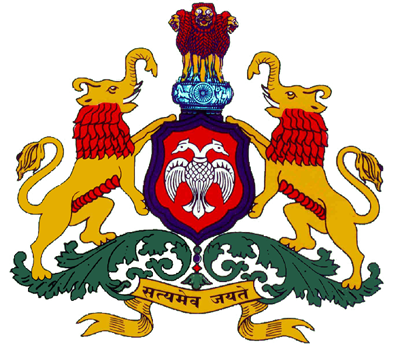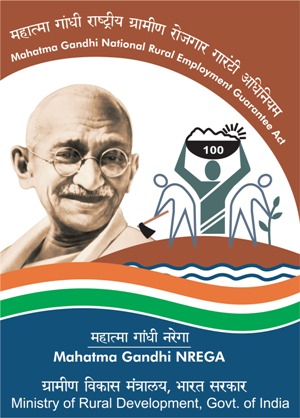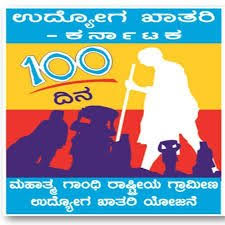Mahatma Gandhi National Rural Employment Guarantee Scheme
Objectives:
1) To provide minimum of 100 days of waged unskilled labour in a financial year to every rural family willing to do unskilled labour under the Mahatma Gandhi NREGS
2) Creation of durable assets in rural areas.
3) Strengthening livelihood activities of rural people by creating Individual assets.
Jobcard:
It is mandatory for rural families to have a job card to avail the benefits of NREGS.
Persons above 18 years of age from any rural family living in rural area can apply for job card in their respective Gram Panchayat and get job card.
The Gram Panchayat should conduct the necessary verification and issue the job card within 15 days of the application for the job card.
Job card must be in possession of beneficiary. Any other person or Gram Panchayat officer/staff keeping job card in their possession is a violation of NREGA Act. Penalty under Section 25 of the Mahatma Gandhi NREGA Act can be imposed if the job card is kept in the possession of Gram Panchayat or NREGA staff or any other person.
Every 15 days, details of employment given to the beneficiary, days worked, amount of wages paid, etc., should be updated in the job card by the Gram Panchayat.
Cancellation of Job Cards:
Job cards can be cancelled only in the following cases.
1. If the family migrates permanently to an urban area or
2. If the job card is found to be fake or
3. If job card is obtained by submitting duplicate documents or
4. In case of permanent migration of family from Gram Panchayat area.
In the event of any Gram Panchayat being upgraded to Urban Local Body, the job cards issued to all the families residing in such locality shall be automatically cancelled
Submitting a Work Demand:
Any family registered under the scheme and having a job card can apply to Gram Panchayat in Form-6 for work.
Work demand applications received by the Gram Panchayat must be registered in a register and a dated acknowledgment issued to the applicant.
You can also apply for the job in the following ways.
1. Toll free helpline number 1800-4258-666
2. In case illiterate persons make a demand for work verbally, the Gram Panchayat should record their demand in writing.
3. Labourer can submit job application on white sheet also.
The Gram Panchayat has to give the job to the applicant within 15 days of applying for the job. Failing that the applicant is entitled to unemployment allowance.
Works to be undertaken under the scheme: The works to be undertaken under the scheme are divided into 04 categories.
Category-A: Natural Resource Management Works:
Water conservation and water recharge works like check dams which increase ground water. Special emphasis should be given to groundwater recharge including drinking water sources.
Watershed development and maintenance works: Works like Contour trench, Contour bunds, Terracing, boulder check, gabion structure.
Micro and minor irrigation works.
Development of canals Rejuvenation of traditional water bodies like lake, Kalyani, Gokatte.
Afforestation Works- Roadside Plantation, Block Plantation, Agro forestry Works
Land development works on community lands.
Category- B -Construction of Individual and Community Assets for Vulnerable Sections:
These works shall be given only to the beneficiaries mentioned in Schedule-1, Para 5 of Mahatma Gandhi NREGA Act 2005.
Works to increase the fertility of agricultural lands and provide irrigation facilities to the lands like construction of dams, agricultural pits, bore wells, land development.
Bamboo, rubber and coconut crops
Horticulture crops, sericulture and afforestation works on agricultural lands
Fodder cultivation.
Development of waste lands
Unskilled labour cost of construction of sanctioned houses in housing schemes
Construction of Livestock Sheds like Cattle, Sheep, Goat, Poultry, Pig etc.
Fishery works like construction of fish drying sheds, storage system, fish farming sheds
Bio-manure making works like vermi compost.
Category-C Basic amenities for SHGs:
Agricultural productivity enhancing works like construction of warehouses for storage of agricultural produce and bio-fertilizer manufacturing facilities
Construction of work sheds for Self Help Societies activities.
Category-D – Rural Infrastructure:
Sanitation Works: Individual toilet, school toilet, Anganwadi toilet, liquid and solid waste disposal works.
Rural road and drainage works Construction of compound and playgrounds for government schools.
Flood control works
Development works of Gram Panchayat Building, Anganwadi Building, Cyclone Shelter, Anganwadi Building, Rural Markets and Graveyards.
Construction of rural warehouses
Production of construction materials like bricks required for the construction works undertaken under the Scheme
Maintenance of rural properties constructed under the scheme
Any other works notified by the Central Government.
Individual Works: Schedule-1, Para 5 of the Mahatma Gandhi NREGA Act states that Individual Works are to be carried out on preference of the following categories of beneficiaries.
1) Scheduled Caste
2) Scheduled Tribe
3) Nomadic tribes
4) Tribes omitted from notification
5) Families below poverty line
6) Women headed households
7) Families of Handicapped
8) Land reform beneficiaries
9) Beneficiaries of housing schemes
10) Beneficiaries of Forest Rights Act-2006
11) Small and Micro Farmers
Beneficiary must have job card to get Individual benefit under NREGS.
At least one member of his family should work in the Individual work given to the beneficiary.
According to sECC Survey 2011 “women-headed household means a household without any males between the ages of 16 to 59 years” as a women-headed household.
A family can be given Individual benefits up to a total of Rs.2.50 lakhs under the scheme
Karnataka State Unemployment Allowance Payment Rules – 2021
1. Name and Title,
(1) These rules shall be called the Karnataka State Unemployment Allowance Payment (Amendment) Rules - 2021.
(2) These rules shall come into force on the date of their final publication in the Karnataka State Gazette.
2. Terms:-
(1) 'Act' means the Mahatma Gandhi National Rural Employment Guarantee Act, 2005 (Central Act 42 of 2005);
(2) 'District Program Co-ordinator' means the Chief Executive Officer of a Zilla Panchayat.
(3) 'Fund' means the Karnataka State Employment Guarantee Fund established under section 21 of the Act.
(4) 'Programme Officer' means the Taluk Panchayat Functioning Officer.
(5) 'Scheme' means the National Rural Employment Guarantee Scheme-Karnataka notified under section 4 of the Act.
(6) 'State Council' means the Karnataka State Employment Guarantee Council constituted under section 12 of the Act.
(7) “unemployment allowance” means a payment made under section 7 of the Act.
3. Competent Authority :- The Gram Panchayat shall be the competent authority for payment of unemployment allowance under the scheme framed under section 4 of the Act.
4The procedure for payment of unemployment allowance and mode of payment shall be prescribed in the scheme framed under section 4 of the Act.
5. Essential conditions to be fulfilled for claiming unemployment allowance:-
(a) The individual, i.e. the family, shall have an job card and shall identify the individual with an individual number.
(b) The person shall apply to the Gram Panchayat for employment in Form-6 or in any other manner authorized by the Government and shall have a dated receipt issued by the Gram Panchayat and the application shall be recorded in the NREGA MIS.
(c) The Gram Panchayat shall not have provided employment within fifteen days of the person's application for employment or the date specified in the application, whichever is later.
2. Addition of new cases: The following cases shall be added after Article 5 of the Basic Rules.
5A. Unemployment Allowance payable:- The unemployment allowance shall not be less than one fourth of the wages for the first 30 days of the financial year and one second of the wages for the remaining days of the financial year
5b. Procedure for Payment of Unemployment Allowance:-
(1) An application for unemployment allowance shall be submitted by the individual to the Taluk Panchayat Assistant Director (Rural Employment). The Assistant Director (Rural Employment) shall, within one month of the application by the person, give notice to both the parties, hold an inquiry, verify the facts and issue an order regarding unemployment allowance. If the unemployment allowance is agreed to, the dereliction of duty should be identified in the order.
(2) A party aggrieved by the order of the Assistant Director (Rural Employment) shall appeal to the Deputy Secretary (Development), Zilla Panchayat within 15 days of the order. The Deputy Secretary (Development) shall examine the appeal petition and issue an order within one month of the submission of the appeal.
(3) The party aggrieved by the order of the Deputy Secretary (Development) shall appeal to the Chief Executive Officer, Zilla Panchayat within 15 days of the order. The Chief Executive Officer shall review the appeal application and issue a final order within 03 (three) months of the submission of the appeal.
(4) If no order is passed by the Assistant Director (Rural Employment) within 15 days of the person applying for unemployment allowance, the person may apply for unemployment allowance directly to the Deputy Secretary (Development).
5c. Compensation for delay in payment:- The unemployment allowance should be paid to the person within 15 days of the order for payment of unemployment allowance. In default the person is entitled to delay compensation.
5d. The liability to pay unemployment allowance ceases when:- the person,
(1) the person has been directed by the Program Officer of the Gram Panchayat or Taluk Panchayat to report for work by him or any other adult member of his family; Or
(2) the period for which he sought employment has expired and any member of his family is absent from work; Or
(3) his family has already obtained employment for one hundred days in that financial year or equivalent days as notified by the Government under section 3(4) of the Act; Or
(4) In case his family has received such wages as would be available for one hundred days in that financial year, including wages and unemployment allowance for days worked,
- The liability of the State Government to pay unemployment allowance shall cease.
5e. Rejecting a claim for unemployment allowance:- A person,
(1) If the employment offered is rejected, or
(2) Fails to report for work within 15 days of being directed to report for work, or
(3) Absence from work for a period exceeding one week without the permission of the implementing agency, or
(4) Absence from work for a total period exceeding one week in any month without obtaining permission,
-Not eligible to claim unemployment allowance for a period of three months under the Act. But in any case he is eligible to get the job.
5f. Failure of the authorities referred to in section 5(b) of these rules to take any decision and issue an order regarding unemployment allowance within the prescribed period shall automatically make the person eligible for unemployment allowance.
6. Terms and conditions for non-payment of unemployment allowance:
A. If the liability to pay unemployment allowance has ceased in terms of the provisions of sub-section (3) of section 7 of the Act;
B. The Central Government, under sub-section (2) of section 27 of this Act, has ordered the stoppage of funds,
- Then unemployment allowance will not be paid.
7. Unemployment allowance shall not deduct the employment entitlement of the family. Even if the unemployment allowance is provided, the family shall continue to be entitled to it if it claims for at least 100 days of work in a financial year.
8. Unemployment Allowance Fund:- The unemployment allowance shall be paid from the account of Karnataka State Employment Guarantee Fund (AEC). Thereafter, the unemployment allowance amount of the officer/employee responsible for the payment of unemployment allowance shall be recovered and paid into the Karnataka State Employment Guarantee Fund account.
9. Report of payments made from the fund:-
(1) The Program Officer of the Taluk Panchayat shall submit a monthly report of the expenditure incurred under the Unemployment Allowance Fund to the District Program Co-ordinator and to the State Government.
(2) The Custodian of the State Fund shall submit to the State Council for its consideration a monthly report of the expenditure and of the money released from the Unemployment Allowance Fund.
Facilities at work site:
The following facilities shall be provided to laborers at the site of works as mentioned in Schedule 2, Para 23 of Manrega Act.
* Clean drinking water
* First aid box
* Shadow
Where there are 05 or more children below the age of 05 years along with labourers in any work place, one shall depute women labourers for the care of such children and pay them the wages paid to labourers under the scheme.
Compensation in case of injury / death during work:
Para 25 to 28 of Schedule 2 of NREGA Act provides for compensation to labourers in case of accident, injuries and death arising out of work or at work place.
* Para 25- Any laborer engaged in work under the scheme, injured on account of work and due to any mishap during work, shall be given free medical treatment.
* Para 26- If an injured labourer requires hospitalization, the Government shall arrange for his hospitalization, treatment and medication and shall pay him a daily allowance of not less than half the wage rate during that period.
* Para-27- In case of death or permanent disability of any laborer engaged in the work of the scheme due to work and any accident occurring during work, to his legal heirs as prescribed under Pradhan Mantri Suraksha Vima Yojana or as notified by the Central Government Amount compensation should be given.* Presently under the Pradhan Mantri Suraksha Vima Yojana, the heirs of a person who dies or becomes disabled is entitled to Rs. 2.00 lakh compensation is allowed and in the above case compensation of the same amount should be given to the heirs of the labourers.
* Para-28: Free medical treatment shall be provided to any child present at the place of work with the laborer performing work under the scheme in case of accidental injury and in case of death or disability due to accident, compensation shall be paid to the parents in such amount as may be fixed by the State Government.
Kayaka Bandhu:
With the objective of extending the benefits of the Mahatma Gandhi National Rural Employment Guarantee Scheme to the rural labourers to a greater extent, provision has been made in the operational guidelines of the scheme to involve Kayaka Bandhu (Mates) to organize the labourers and manage the workplace.
The unskilled laborers registered under the scheme will be divided into groups of 20 laborers each.
Identifying one person in each group of labourers as Kayakabandhu (mate).
Kayaka Bandhu should be chosen by the labourers by consensus of their group.
Must have worked as unskilled laborer in Kayaka Bandhu Scheme and must have studied at least 8th standard.
Priority should be given to women while identifying Kayaka Bandhu. Prioritizing women Kayak Bandhus will help organize women workers and promote women's participation.
Resposibilities to be performed by Kayaka Bandhu:
Kayaka Bandhu obtains work demand from his/her group in in Form-6 and submits to Gram Panchayat for acknowledgment.
Coordinating with the Gram Panchayat and ensuring that the labourers get the job within 15 days of applying for the job.
The Gram Panchayat shall ensure that the labourers attend the work on the scheduled day at the place of work mentioned in Form-8.
To assist in marking the workplace and to inform the labourers about the amount of work to be done to get the prescribed minimum wages.
Maintaining Attendance List (NMR) at work place every day and obtaining attendance of labourers.
Ensuring that facilities such as shade, drinking water, first aid etc. are available to the labourers at the workplace.
Providing necessary assistance to Technical Assistants for taking measurement of work.
To provide necessary assistance to Gram Panchayat for payment of wages within stipulated time frame after completion of work.
To record the details of work done by the laborers in the job card.
To ensure that every family gets 100 days of work in a year.
Active participation in social exploration with his/her group of workers.
Participation in Rozgar Day, IEC activities of the Scheme.
Remuneration to Kayak Bandhu:
c) For every person-day created by his/her group of labourers in addition to the non-skilled wages fixed under the scheme, a Kayaka Bandhu will be given a honorarium Rs. 4.00 for male Kayaka Bandhu and Rs. 5.00 for female Kayaka Bandhu
b) Kayaka Bandhu's work shall be treated as as semi-skilled work and additional remuneration shall be paid under material cost
Barefoot Technician
Under the Mahatma Gandhi National Rural Employment Guarantee Scheme, BFTs will be actively engaged to create more person –days by organizing labourers, engaging them in works and monitoring the workplace of implementing works. One BFT for every 2500 active job cards will be identified and assigned to Gram Panchayats after Screening Test, Training and Certification.
BFT has prescribed the following qualifications to select the candidates. Based on these qualifications, the applied candidates will be selected for Screening test in the ratio of 1:3.
1. Must be an active worker under Mahatma Gandhi NREGS (Active worker under Mahatma Gandhi NREGS means that the person should have worked as a labourer under the scheme for at least 2 years in the previous 3 years).
2. Must have passed at least 10th standard.
3. Preference will be given to local candidates.
4. Adequate preference to be given to women, Scheduled Caste and Scheduled Tribe candidates.
5. Should be below 45 years of age.
BFTs have identified following tasks to be performed in Scheme implementation.
1. To assist the Technical Assistant in identifying the works that can be undertaken under the Mahatma Gandhi NREGS.
2. Collecting the baseline information (land use, ownership etc.) of the beneficiaries related to the works of Mahatma Gandhi NREGA Scheme and providing it to the technical assistants.
3.Assisting Technical Assistants in making technical survey, preparation of estimate sheet, drawing and designing of scope and nature of proposed works.
4. Obtaining demand for work from labourers and Mates in Form-6 and submitting to Gram Panchayat.
5. Supervising the execution of works.
6. Site management of works, supervision of Mates
7. Direct to technical assistant to measure work in time.
8. Maintaining necessary records at work site.
9. Obtain attendance list from Gram Panchayat, record attendance of laborers and submit.
10. Ensuring availability of facilities such as drinking water, shade, childcare, first aid box to be provided at the work site.
11. Preparation of brief note of material required for works and estimated man days.
12. BFTs to have their own smart phone. Through this Geo MGNREGA app will effectively implement other functions including geo tagging.
13. In addition to the above tasks, perform other tasks related to Mahatma Gandhi NREGS as directed by the Program Officer, Panchayat Development Officer and Technical Assistant.
Gram Kayaka Mitra
Qualifications:
1. Only women should apply for the posts of “Grama Kayaka Mitra”.
2. Qualification – Candidate must have passed at least 10th standard.
3. Candidate must have an active job card under Mahatma Gandhi NREGS in Gram Panchayat where he is applying as on date: 01-01-2021.
4. The candidate should have worked as an unskilled laborer under the scheme for at least two years in the last three years (2018-19, 2019-20 and 2020-21).
5. Age Limit – Not exceeding 45 years as on Date: 01-01-2021.
6. Must know reading and writing well.
7. While applying for the post of Gram Kayaka Mitra, only the candidates residing within the respective Gram Panchayats should apply.
8. The candidate should possess effective communication skills, good leadership qualities and be responsive to the community.
9. Gram Rozgar Mitra should give specific time for community work which should be supported by Gram Rozgar Mitra's family and society.
Tasks to be performed by Gram Kayak Mitra:
1) Gram Kayaka Mitras visit their Gram Panchayat houses to create awareness about Mahatma Gandhi NREGS and motivate them to work in the works of the scheme.
2) Receipt of applications in Form-1 from people seeking employment card under Mahatma Gandhi NREGS, acknowledgment and issuance of employment card.
3) Receiving work demand in Form-6 from the laborers who want to work under the scheme, obtaining acknowledgment from Gram Panchayat A and ensuring that work is available within the stipulated time frame.
4) To maintain the file and 07 registers of the works implemented after the appointment of Gram Kayaka Mitra.
5) Updating details of work performed by laborers in job cards.6) Display of posters addressing Mahatma Gandhi NREGAYojana at public places within the Gram Panchayat viz bus stand, schools, anganwadi centers, milk producers associations, farmer service center, fair price shop etc.
7) Organizing at least 2 Rozgar Days every month.
8) Organize a meeting of the members of Self Help Societies at least once in a month to inform them about the NREGS and motivate them to get involved in the scheme.
9) Conducting meeting of Kayaka Bandhus every month and monitoring their performance.
10) To provide employment under the scheme to the weaker sections under the Gram Panchayat.
11) Receiving demands from the people during the campaigns organized from time to time under the scheme and giving them to the Gram Panchayat.
12) Other functions related to NREGS as may be prescribed by the Panchayat Development Officer.
Preparation of Labor Budget and Action Plan:
The Gram Panchayat is responsible for identifying the works to be undertaken under the scheme as per the recommendations of the Ward Sabha and Gram Sabhas.
The following time limits are prescribed in the Scheme guidelines for preparing the labor budget.
Instructions for preparing action plan:
1. Action Plans of Implementing Departments must be part of Action Plan of Gram Panchayat. Apart from the express directions of the Government, implementing departments cannot approve separate action plans in other cases.
2. The action plan should be approved in the village meeting as per rules.
3. Farmers' Action Plan: As per Mahatma Gandhi NREGAYojana guidelines, 60% of the total expenditure should be spent on agriculture and related activities. In order to simplify the selection of beneficiaries in respect of individual works, all scheduled castes and tribes under gram panchayats, BPL families, small and micro farmers, disabled persons, as defined in the Government Order of "Antarjala Chetana" in Schedule-I, Para 5 of the Mahatma Gandhi NREGAActThe list of all the defined categories of eligible beneficiaries shall be presented in the village meeting and approved at once. Any beneficiary in the list so approved will be eligible to avail Individual works due to him within the limit of Rs.2.50 lakhs in the next financial year.
4. Groundwater Conservation Action Plan: At least 65% of the total estimated cost of the annual action plan must be earmarked for natural resource management works.
5. Labor Material Ratio: While calculating the labor material ratio in the estimated cost of the works taken up in the annual action plan, the labor material ratio given in the sample estimate papers must be considered. The material ratio should not exceed 40% of the total estimated cost of the annual action plan of the Zilla Panchayat.
6"Mahatma Gandhi National Rural Employment Guarantee Scheme Karnataka" 2007 Case 12 The estimated amount earmarked for road works shall not exceed 10% of the total estimated cost of the annual action plan.
Labour Material Ratio: 1st Schedule of Manrega Act, Para 20 states that “The material cost shall not exceed 40% at the district level of all works undertaken by Grama Panchayats and implementing departments under the scheme, including skilled and semi-skilled labour.
Maintenance of Mandatory Registers at Gram Panchayat Level: The following registers shall be mandatorily maintained in the Gram Panchayat under the scheme.
Register-I – Job Card (Application, Registration and Issuance) and Family wise Employment Register
Register-II - Gram Sabha Meetings (Proceedings, Resolutions and Priority Works) Register of Special Social Survey Gram Sabha Meetings (Proceedings and Compliance)
Register-III – Register of demand, allocation of work and payment of wages
Register- IV - Works Register
Register- V - Immovable Property Register
Register- VI – Complaint Register
Register- VII - Materials Register




















